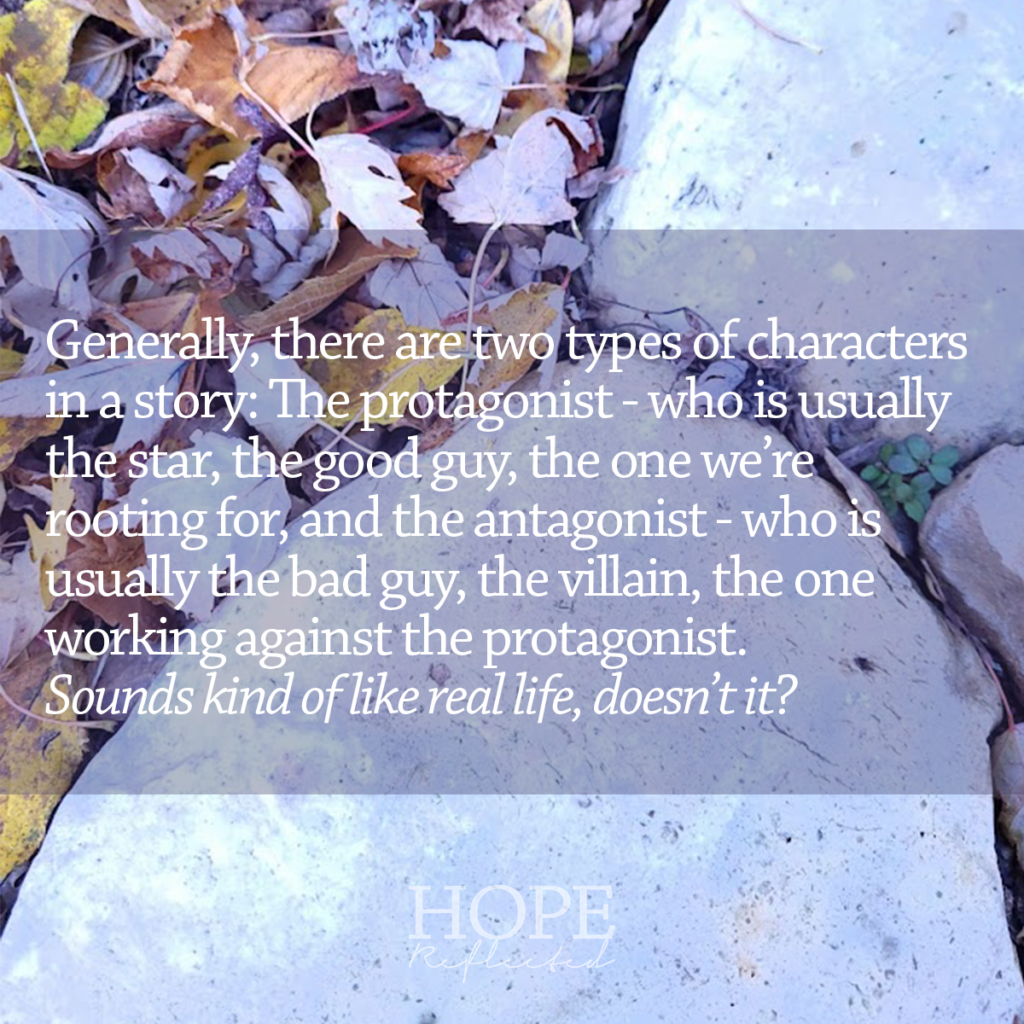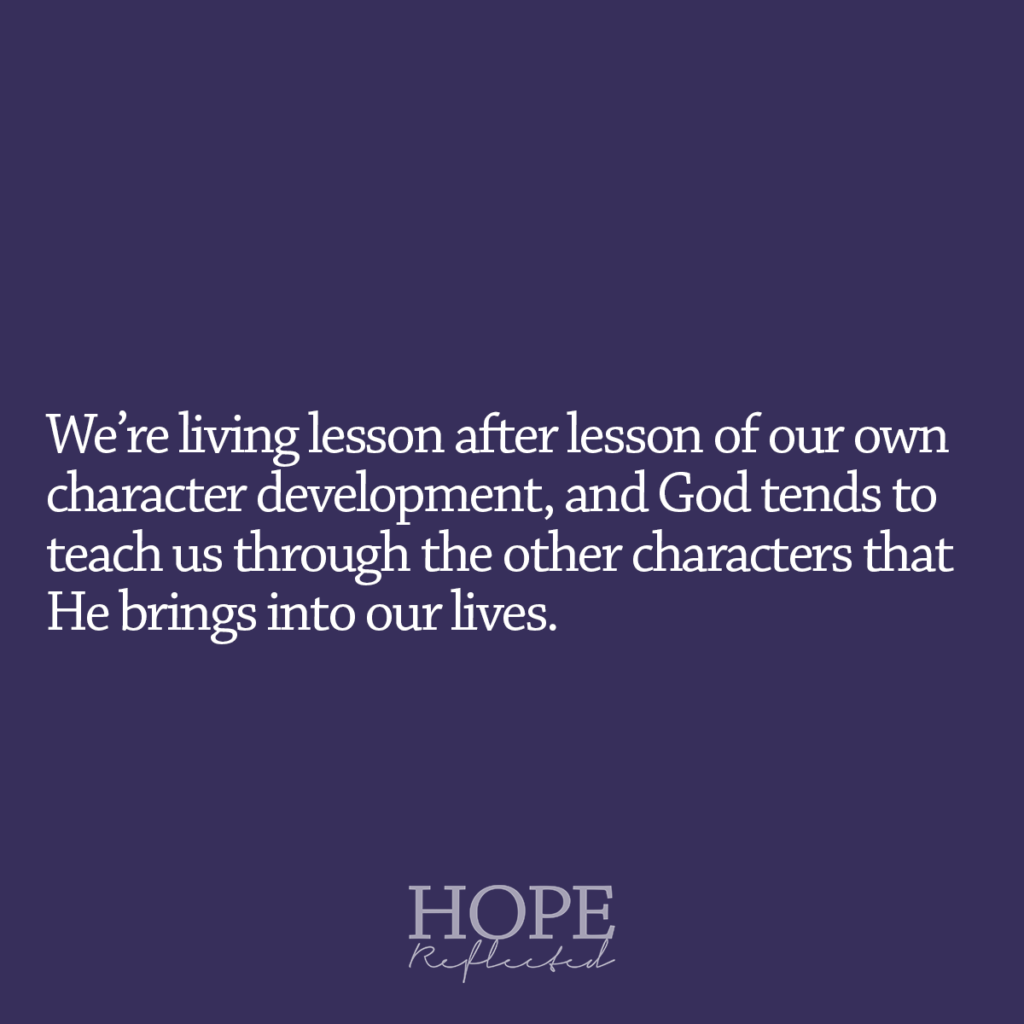The agony of antagonism
Written by H, Posted in Christian Living, Published Work

Character Development 101
One of the essential elements taught in any story-writing class is that of character development. Generally, there are two types of characters in a story: The protagonist – who is usually the star, the good guy, the one we’re rooting for, and the antagonist – who is usually the bad guy, the villain, the one working against the protagonist.
Sounds kind of like real life, doesn’t it? We’re always living lesson after lesson of our own character development, and God tends to teach us through the other characters that He brings into our lives.
The word antagonist comes from the Latin antagonista, meaning “competitor, opponent, rival” or “one who contends with another”. Anti means “against” and agon means “a struggle, contest”, and is where we get our present-day word agony. Appropriate, as it can be agonizing dealing with an antagonist.

Provoked and purposefully poked
Antagonists typically provoke someone of whom they’re jealous, resentful, or they just don’t like. In the case of Elkanah’s two wives, Hannah and Peninnah, Peninnah knew that Hannah was barren and she continuously contended with her about this. Even though Peninnah had children and Hannah was barren, Elkanah gave Hannah “a worthy portion; for he loved Hannah” (v. 5). Peninnah was jealous, and because of her resentment, Peninnah preyed upon Hannah’s weakness and “provoked her sore, for to make her fret,” (v. 6). It wasn’t that Peninnah antagonized Hannah once, no, the Bible says, “so year by year, when she went up to the house of the LORD, so she provoked her;” (v. 7). Hannah was so deeply affected by this antagonism that “she wept, and did not eat.” (v. 7). Can’t we all relate? Chances are you have someone in your life who knows something that really bothers you, and they purposefully poke you in that area, trying to provoke you and get a reaction out of you.
The proper response to antagonism
Hannah’s response is everything. “And she was in bitterness of soul,” (v. 10). It would be a lie to say that when someone antagonizes you that you can just rise above and be the bigger person; God knows our hearts. It hurts when someone maliciously tries to manipulate and provoke you. Hannah was in bitterness of soul, and she “prayed unto the LORD, and wept sore.” (v. 10). Can’t you just picture her, completely worn out, worn thin, and weary – falling flat on her face and giving it all to God? And what does she pray? She asks God to remember her, and not forget her, and she asks in faith and commits the deepest desires of her heart to God. Can the same be said for us? When we’re antagonized and provoked, do we – bitterness of soul and all – take our vulnerabilities and our weaknesses to the Lord? Or do we bite back, allow the antagonists in our lives to hurt us, and to control us through their actions?

Do we take our vulnerabilities and weaknesses to the Lord? Or do we bite back and allow the antagonists in our lives to hurt us?
Hope Reflected
It’s interesting to note that after Hannah commits it to the Lord, we don’t read of Peninnah again. We do read, however, that the Lord remembers Hannah (v. 19), and that she remembers God’s faithfulness to her.



![False friends or counterfeit kindness; whatever you want to call it, the world is filled with people who will say one thing to your face and then another behind your back; people who will woo you in order to get something from you.
It’s sad, but it’s true.
The Bible provides us with examples from Joab to Judas, and yet, we’re surprised when we find ourselves deceived and hurt by someone else.
So what are some of the hallmarks of a true friend?
You can read more about this on hopereflected.com [Link in profile]
.
.
.
#friends #friendship #kindness #counterfeitkindness #hurt #proverbs #truefriends #hopereflected #blog #blogpost](https://www.hopereflected.com/wp-content/plugins/instagram-feed/img/placeholder.png)